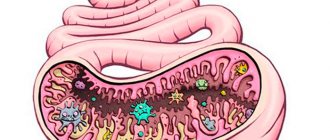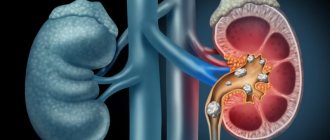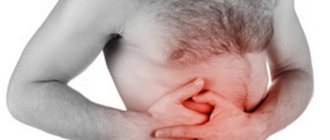In adults, the smooth muscle muscles of the ENT organs and gastrointestinal tract are well developed, so coughing before vomiting is not common in them. Vomiting during a coughing attack is a sign of an advanced disease. Similar symptoms are typical for diseases accompanied by inflammation of the pharynx, bronchi, and trachea. Swelling of the mucous membranes and phlegm irritate the sensory receptors that are located in the pharynx, larynx, bronchi, and at the root of the tongue. With prolonged paroxysmal coughing, this leads not only to coughing up mucus, but also to the eruption of vomit.
Why does a person vomit from coughing?
The mechanism of vomiting during a cough attack is of a complex reflex nature. The cough and vomiting centers are located in the medulla oblongata. When both are irritated, a person develops a vomiting cough. Regurgitation (reverse movement) of the food coma is provoked by irritation of the receptors.
During a coughing attack, the abdominal muscles contract, which sometimes causes vomiting. A productive cough is accompanied by the release of bronchopulmonary secretions (sputum), which irritates the cough receptors in the throat as it moves along the respiratory tract.
Allergy
Diseases of allergic origin are often accompanied by a spasmodic dry cough. Inflammation and swelling of the respiratory system are provoked by allergens:
- dust mites;
- household chemicals;
- traffic fumes;
- perfumery;
- animal hair;
- fungal spores, etc.
The disease begins with a tickling in the throat, sneezing, runny nose, cough. Because of this, contractions occur in the intestines, leading to vomiting.
During a prolonged attack, the food lump from the intestines first disappears into the stomach, and from there into the respiratory tract and mouth.
Heart failure
Pathologies of the cardiovascular system are sometimes accompanied by a non-productive periodic cough. Due to lack of oxygen in the body, the patient begins to suffocate. The following symptoms indicate cardiac pathology:
- dyspnea;
- wheezing when breathing;
- cyanosis (blue discoloration) of the skin;
- hemoptysis;
- cardiopalmus.
A cough attack leads to an increase in the tone of the abdominal muscles and relaxation of the alimentary tract in its upper part. For this reason, the patient experiences nausea and vomiting.
Nervous cough
Strong experiences sometimes cause coughing attacks with vomiting in a child or adult. Excessive loads on the central nervous system disrupt the functioning of the medulla oblongata, and erroneous activation of the cough and vomiting centers occurs. Vomiting attacks can be caused by:
- car crashes;
- tense family situation;
- aversion to work;
- public performance;
- recent loss of parents and close relatives.
To eliminate psychogenic cough and gagging, it is necessary to normalize the psycho-emotional background. If a person cannot cope with the problem on his own, it is worth contacting a psychoanalyst.
Bronchial asthma
The disease is characterized by obstruction (narrowing) of the bronchi against the background of allergic reactions and immune disorders. Allergens provoke swelling of the mucous membranes, which causes:
- debilitating cough;
- feeling of chest constriction;
- difficulty breathing;
- wheezing;
- vomiting
Asthma is dangerous due to pneumothorax - damage to the lungs and penetration of air into the pleural cavity.
Oncological diseases
A nonproductive cough with vomiting for 4 weeks or more sometimes indicates cancer. Malignant and benign tumors in the respiratory organs lead to irritation of sensory receptors, which causes attacks with vomiting. Tumor pathologies are also indicated by:
- slight increase in temperature;
- fast fatiguability;
- discomfort in the throat;
- hard breathing (with lung cancer).
If symptoms appear against the background of periodic bouts of coughing with vomiting and do not go away within a month, you should consult a doctor. Early diagnosis of cancer increases the chances of a complete cure.
Smoking
In heavy smokers, coughing attacks with vomiting occur mainly in the morning. This reaction is associated with a violation of the cleansing function of the ciliated epithelium, which is located in the bronchi, trachea, laryngopharynx, etc.
Tobacco smoke contains resins that stick to the mucous membrane, modifying the cilia of the epithelium. This does not allow the mucous membrane to clear itself of sputum and foreign bodies. The person coughs very hard, to the point of vomiting.
Colds
The cause of cough is most often the accumulation of mucus in the respiratory tract due to inflammation. Attacks with vomiting are characteristic of advanced forms of the following diseases:
With bronchitis, inflammation of the bronchi is observed, leading to swelling of the mucous membranes and excessive production of sputum.
Whooping cough
A dry cough leading to vomiting often becomes a manifestation of whooping cough. The disease poses a particular danger to preschool children. It is accompanied by severe attacks, which are fraught with impaired cerebral circulation. Whooping cough is indicated by:
- frequent sneezing;
- low temperature;
- redness of the eyes and throat;
- runny nose.
During a coughing attack, a characteristic whistle occurs when inhaling and vomiting when exhaling.
Tuberculosis
For a long time the disease is practically asymptomatic. The first manifestations of pulmonary tuberculosis are nonspecific:
- fast fatiguability;
- pale skin;
- low temperature;
- weight loss;
- excessive sweating.
Over time, coughing attacks occur, causing chest discomfort. The cough is accompanied by vomiting and hemoptysis when tuberculous pleurisy is associated. The patient is constantly bothered by a runny nose, constipation or diarrhea, and wheezing in the lungs.
Parasitic diseases
A non-productive, spasmodic cough that worsens at night indicates the proliferation of parasites in the body. Coughing attacks with vomiting accompany the following parasitic diseases:
Worms poison the blood and soft tissues with waste products, which leads to the body attempting to get rid of toxins through vomiting.
Other reasons
Cough attacks accompanied by vomiting are sometimes provoked by the following reasons:
- pathologies of the thyroid gland;
- neurological disorders;
- gallbladder dysfunction;
- abuse of antihypertensive pills;
- insufficient air humidity in the room;
- gastroesophageal reflux;
- work in hazardous production.
Even if the symptoms are not accompanied by other manifestations of a cold (runny nose, sneezing, high temperature), you should consult a doctor.
What should parents not do?
A child's cough with vomiting at night unbalances even the most persistent parents and they begin to do things that are strictly prohibited. Sometimes the desire to help your child goes beyond all boundaries and becomes not help, but a reason for the deterioration of his condition. When providing first aid, do not do the following:
- Yell at the child and try to shame him so that he can deal with his problem himself. It doesn’t matter whether the attack was caused by a pathological process or a psychological disorder, the baby needs your participation and attention. The faster the child calms down, the faster his condition will return to normal, so it is important for parents to quickly calm both themselves and their child.
- In an attempt to relieve fever, which is often associated with coughing and vomiting, parents use some traditional methods. They certainly work, but while they are not dangerous for adults, they are very dangerous for children. This includes rubbing with alcohol and vinegar, diluted in water or in pure form. For infants and young children, this is poison, because their skin instantly absorbs everything, poisoning the body with alcohol or burning the skin with acetic acid.
- While the cause of the attack is unknown, you should not use mustard plasters or jars. If coughing with vomiting is triggered by an allergen, they will lead to increased bronchospasm, which can be fatal.
- Almost every family now has a nebulizer. And it really helps relieve cough even in infants. But even this procedure must be prescribed by a doctor, as well as the medicine that will be used for it. To relieve dry cough in older children, you can use safe Borjomi or saline solution for a nebulizer. Steam inhalations are carried out only for children over 12 years of age.
- Self-selection of a drug to relieve cough is incredibly dangerous for children. After all, if you make a mistake, the antitussive drug will retain phlegm and aggravate the child’s condition, delaying his recovery. Vomiting when coughing is a sign that should not be ignored. Therefore, the doctor must examine the child as quickly as possible.
How to stop coughing before vomiting: first aid for an attack
Vomiting when coughing requires calling a doctor at home, since symptoms often indicate a serious condition and an advanced form of the disease.
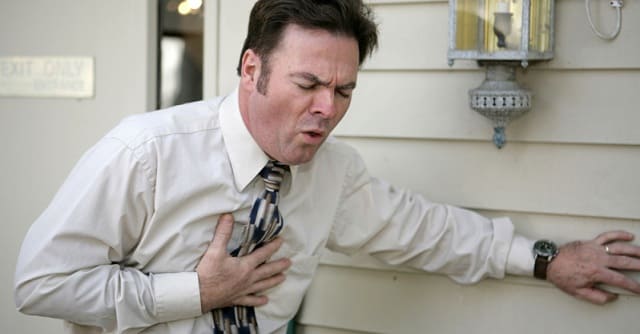
Before the specialist arrives, the patient is given first aid:
- To facilitate breathing and ventilation of the room, open all the windows in the room.
- To speed up the clearing of mucus from the airways, place 2 pillows under your head.
- Unbutton or remove tight clothing.
- Hang wet towels and sheets in the room to humidify the air.
- After an attack, wash your face with water and give a warm drink - compote, green tea, fruit juice, milk.
It is undesirable to perform steam inhalations during an attack or give the patient antitussives when coughing up sputum.
Doctor Komarovsky about the treatment of cough with vomiting in children
Pediatrician E. O. Komarovsky, well-known in many countries of the post-Soviet space, believes that it is not the cough that should be treated in children, but the underlying disease that caused its development. The doctor recommends:
- maintain the necessary microclimate in the sick child’s room (air humidification, room ventilation);
- take him for daily walks (provided his body temperature is normal);
- drinking plenty of water;
- exclusion from the diet of foods with high allergenic properties (citrus fruits, eggs, fresh milk, cocoa, chocolate, strawberries);
- carrying out etiotropic (antiviral and antibacterial drugs) and symptomatic (antipyretic, expectorant) therapy as prescribed by the attending physician;
- regular removal of accumulated mucus from the nasal cavity and mouth;
- carrying out inhalations using a nebulizer.
Tablets and syrups
Before treating a severe cough leading to vomiting in an adult with medications, you should consult a doctor. Therapy begins only after a diagnosis has been made and the causes of the disease have been determined. For bacterial infections of the respiratory system, antibiotics are prescribed, and for viral or fungal infections, antiviral or antimycotic (antifungal) medications are prescribed.
Suppressive cough
A very severe dry cough that causes vomiting is treated with antitussive syrups and tablets. Centrally acting drugs suppress the functions of the cough center, and peripheral ones reduce the sensitivity of sensory receptors. The treatment regimen includes the following drugs:
If expectoration is good, antitussives are not used. This is fraught with impaired lung function and bacterial inflammation.
Removing phlegm
If cough and vomiting are accompanied by sputum production, mucolytic and expectorant drugs are prescribed. The former reduce its viscosity, and the latter stimulate its removal from the respiratory system. For ENT diseases, the following pharmaceuticals are used:
- ACC;
- Ambrobene;
- Bromhexine;
- Mukaltin;
- Fluicort;
- Gerbion;
- Libexin Muco;
- Bronchosan.
With the systematic use of these medications, cough productivity increases, due to which the lungs are cleared of mucus accumulations.
Anti-inflammatory
To eliminate inflammation of the respiratory tract, expectorants and mucolytics with anti-inflammatory effects are used. They accelerate the healing of the mucous membrane, thereby eliminating swelling of the soft tissues and normalizing body temperature. To quickly restore the mucous membrane, the following are used:
Combined-action drugs should be used only on the recommendation of a specialist for 5-7 days.
Effective folk remedies
To overcome coughing and vomiting, traditional medicine is often used. Some herbs and foods have pronounced expectorant, softening, anti-inflammatory and regenerating properties. Their use alleviates the patient's condition and speeds up recovery.
Burnt sugar
Caramelized sugar lozenges soften the throat, thereby reducing the sensitivity of sensory receptors. To eliminate the urge to vomit, 5-7 tbsp. l. sugar is heated in a frying pan until thick caramel is obtained. It is poured into candy molds and left until completely hardened. Use lollipops at the first sign of a cough attack.
Sage
A decoction of sage eliminates a suffocating cough by relieving inflammation and swelling from the mucous membrane of the ENT organs. To prepare it you need:
- Pour 10 g of raw material into 1 glass of water;
- boil over heat for 10 minutes;
- strain and cool to room temperature.
Rinse your mouth and throat with this decoction at least 3-4 times a day.
Golden mustache
If the cough is not accompanied by sputum, take 1 tsp of golden mustache tincture. 30 minutes before meals four times a day. The product is prepared according to the following recipe:
- 7-10 large leaves are poured with 200 ml of vodka;
- insist in a dark place for 2 weeks;
- add 50 ml of wild rosemary infusion.
For severe cough accompanied by vomiting, the course of treatment will be 5-8 days.
Milk and honey
Cough attacks to the point of nausea are relieved with alkaline solutions. They liquefy mucus and remove it from the lungs. To enhance the anti-inflammatory effect, add 1 tbsp to 1 glass of warmed milk. l. honey Take the product 3 times a day 40 minutes after meals. For ENT diseases, the course of therapy ranges from 10 to 14 days.
Radish juice
Black radish has pronounced immunostimulating, antiseptic and tonic properties. To eliminate vomiting and a terrible spasmodic cough, you need to:
- cut a hole in the vegetable;
- pour inside 2 tbsp. l. honey (if there is no honey, sugar will do);
- cover the radish with a saucer;
- After 2 hours, pour the juice and honey into a glass container.
For mucus that is difficult to remove, take 1 tsp. means 30 minutes after meals three times a day.
Video recipe
Pine buds
The kidneys contain essential oils, tannins, and ascorbic acid, which have a beneficial effect on the body's defenses and destroy infections in the respiratory system. To eliminate cough with vomiting in an adult, use the following remedy:
- 10 g of pine buds are steamed with 250 ml of boiling water;
- simmer over low heat for 3 minutes;
- cool and filter, adding 2-3 drops of lemon essential oil.
Take a decoction of 10 ml up to 4 times a day for acute inflammation.
What to do when you have a paroxysmal cough to alleviate the condition
Coughing attacks are fraught with serious complications, so they cannot be ignored. To relieve a cough, you should:
- lay the patient down with 2 pillows under his head;
- provide warm, plentiful drinks;
- ventilate the room and humidify the air.
If the cause of the attack is known, the patient is given antitussive syrup or tablets. For bronchospasms, bronchodilators are used - Glaucine, Salbutamol, Berodual. If the cough is accompanied by choking, vomiting or muscle spasms, consult a doctor. Such symptoms often indicate a complicated course of respiratory diseases.
An illness always comes unexpectedly and unsettles a person, especially if it is accompanied by severe symptoms. One of its manifestations is a dry cough leading to vomiting in an adult. It is a frequent companion of diseases, which occurs not only with respiratory infections. Cough itself does not pose a danger to the patient, but on the contrary: being a protective reaction of the body, it clears the airways of mucus and foreign objects. However, when the cough has an “obsessive” paroxysmal nature, is debilitating and in most cases dry, this significantly complicates the situation. During or at the end of such an attack, vomiting may even occur. It is these manifestations of diseases that will be discussed, as well as methods of treating the disease and first aid.
Preventive actions
Prevention of cough with bouts of vomiting is aimed at strengthening the child’s immunity. To reduce the risk of developing colds, you must follow these rules:
Healthy lifestyle to prevent cough
- seasonal flu vaccination;
- hand hygiene after visiting the street or toilet;
- limiting contact with sick children;
- balanced diet;
- healing the body: hardening, relaxing by the sea;
- regular walks in the fresh air;
- timely treatment of chronic diseases;
- sufficient physical activity.
Secondary methods of prevention include isolating a sick child in a separate room; until the child recovers, he should not attend kindergarten or school. His room should be regularly wet cleaned with disinfectants, ventilation should be provided, and the temperature in the room should be monitored (normally 20–22°). If the air in your apartment is too dry, you should purchase a humidifier.
A severe cough that leads to bouts of vomiting in children may indicate the development of a serious illness. Therefore, if such symptoms appear, it is necessary to consult a doctor as soon as possible. The pediatrician will conduct an examination, determine the cause of the pathology and select the most effective drugs for treatment.
Video on the topic: How to relieve a coughing attack in a child
Causes and characteristics of diseases with coughing until vomiting
The main cause of coughing before vomiting is irritation of the nerve endings of the vagus and glossopharyngeal nerves, which are located in the mucous membrane of the trachea and large bronchi, in the pharynx and larynx. Reflex impulses can also be carried out from other areas: the nasal cavity, some internal organs and even the cerebral cortex. All these phenomena can occur as a result of developed inflammation and swelling of the corresponding areas of an allergic (dust, pollen), toxic (chemical reagents), parasitic (roundworms) or infectious nature (bacteria, viruses).
Foreign bodies that enter the respiratory tract can serve as irritants. Coughing to the point of vomiting can be caused by external compression of the trachea and bronchi, a tumor, or enlarged thyroid gland and mediastinal lymph nodes.
No temperature
Without fever, adults can develop acute, or more often chronic, bronchitis . This disease is accompanied by a strong paroxysmal cough, at the height of which a gag reflex can be observed.
An allergic dry cough leading to vomiting is usually seasonal and appears during the flowering period, but there is a reaction to perfumes, dust, animal fluff and hair, varnishes, etc.
There are cases of bronchial asthma with this pathology. In this case, attacks of suffocation are accompanied by a cough reflex, and vomiting may occur at the end of the attack. Night attacks of coughing with suffocation are characteristic.
If tracheitis does not involve a secondary infection during the course of the disease, then the disease may also not be accompanied by an increase in temperature. A strong dry cough, often with vomiting, comes to the fore.
Important! Smoking often leads to complications from the respiratory system. Persons with extensive experience very often become patients in pulmonology departments with diagnoses of COPD, bronchial asthma and even oncology.
In heavy smokers , coughing that causes vomiting is not uncommon.
Ascariasis . When helminths are localized in the respiratory tract, receptors in the walls of the trachea and bronchi are irritated, which leads to severe coughing attacks. There is no temperature, but allergic manifestations in the form of various types of rashes or, in more severe cases, a general reaction of the body cannot be ruled out.
The patient may cough with pulmonary heart failure . Stagnation occurs in the pulmonary circulation, which is often accompanied by this symptom, in which attacks of vomiting are not excluded.
Lung cancer with prolonged severe cough, occurring in adults without fever.
Gallbladder diseases , which can provoke a cough attack, often accompanied by nausea and vomiting.
With temperature
Tracheitis and bronchitis in acute form, as well as the chronic course of these diseases, may be accompanied by an increase in temperature. The situation becomes more complicated if coughing attacks resume at night.
Varieties of pneumonia and bronchopneumonia at their height cause severe spasms of the bronchi, while in an adult a very strong cough with a slight secretion of mucus can result in vomiting. A concomitant symptom is severe burning pain behind the sternum.
What diseases cause vomiting when coughing?
In addition to the sign of vomiting when coughing, there is an arrhythmia or increased blood pressure. The patient has severe symptoms: paroxysmal cough, nausea, increased body temperature. First you need to call a doctor to give an opinion, and then figure out how to treat.
Nausea and paroxysmal dry cough in an adult occur due to disorders or the presence of diseases:
- Whooping cough is an infection with severe spasms of the airways that can cause a person to choke.
- Pneumonia (inflammation of the lungs) – the patient may vomit from coughing.
- ARVI is accompanied by fever, weakness, bronchospasms cause vomiting.
- The flu is characterized by a dry cough and vomiting.
- In severe cases of bronchitis, a paroxysmal dry cough appears, especially in the morning.
- In asthma, it is severe and causes shortness of breath.
- Tracheitis can appear as a complication of bronchitis or pharyngitis.
Causes
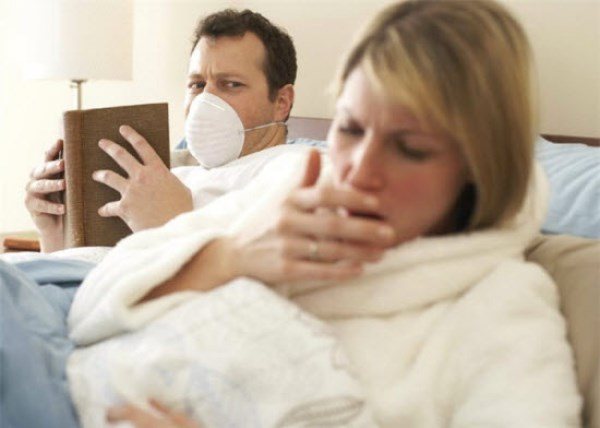
In most cases, cough occurs due to a common cold. But if it is not treated in time, then it can develop into a more serious disease. Convulsive attacks during contraction of the diaphragm can provoke this symptom. Another reason for a vomiting cough is the accumulation of mucus in the nasopharynx. When phlegm flows down the walls of the throat, it causes nausea and provokes vomiting. The reasons for such urges may be an untreated chronic cough, which contributes to the development of serious diseases.
This unpleasant symptom most often accompanies colds or viral diseases, which include bronchitis, influenza, acute respiratory viral infections, acute respiratory infections, pneumonia, and tracheitis. But sometimes it can be caused by other diseases.
- Influenza, parainfluenza, ARVI, acute respiratory infections. Most often, the onset of colds or viral diseases occurs with an irritating dry cough that does not clear the throat. Then it becomes moist, often with purulent sputum and is accompanied by chest pain. These diseases are accompanied by fever, lethargy, migraine, and general intoxication of the body. Sometimes there may be a strong cough to the point of vomiting.
- Acute or chronic bronchitis. The acute form of the disease is characterized by a strong wet cough with the discharge of watery mucus. Chronic disease occurs with a more muffled barking cough. Most often, the patient coughs in a cold or dusty room. In the morning, the signs of bronchitis worsen, and an attack can cause vomiting.
- Pneumonia. It is always accompanied by a strong deep cough, fever, and pain in the lungs. The coughing attack is quite strong, sometimes leading to vomiting. Specific “rusty” sputum may appear.
- Tracheitis. It occurs with a loud cough, specific chest pain, fever, and weakness. The attack begins suddenly, after inhaling cool air or smoke, along with purulent sputum.
- Allergy. Convulsive contraction of the diaphragm during allergies often provokes an uncontrollable cough in an adult, sometimes leading to vomiting. In addition, the disease is accompanied by a runny nose and sneezing. Most often, this reaction occurs through direct contact with the allergen. It is usually a seasonal disease, characterized by exacerbations in spring and summer.
- Bronchial asthma. This disease is accompanied by attacks of suffocation, dry cough and vomiting. Most often, these unpleasant symptoms appear at the initial stage of the disease. But sometimes they bother people with chronic bronchial asthma.
- Ascariasis. During the movement of worms in the lungs, an adult develops a dry, painful cough that leads to vomiting. The disease may be accompanied by fever and skin rashes. Ascariasis causes accumulation of pus in the lungs, intestinal obstruction, and liver disease.
- Acute heart failure. This disease is characterized by a lack of air and the desire to inhale large amounts of it.
- Tuberculosis. When this patient starts coughing, blood and mucus may come out of his mouth. The person’s general well-being deteriorates, an elevated temperature is noted for a long time, and at night the attack only intensifies. Most often at night, patients suffer from severe sweating and chills.
- Lungs' cancer. If an adult with a prolonged severe cough has no fever, this may be a sign of lung cancer. Having discovered this symptom, you need to consult a doctor in order to begin treatment as soon as possible.
- Gallbladder diseases. A person may experience an uncontrollable coughing attack, leading to vomiting. This usually occurs at night, accompanied by cramps in the thighs and legs, the soles of the feet may also burn, hot sweating and pain in the eyes may appear.
First aid
The appearance of cough with vomiting is considered a rather dangerous condition. To cope with this problem, the child needs to provide first aid:
- Calm down and try not to irritate the baby.
- Make breathing easier. To do this, you need to unbutton or take off your pajamas.
- Change the position of the baby's body. He should not lie on his back. In such a situation, if vomiting occurs, the child may choke.
- Open the window, humidify the room. If the baby does not have a temperature, he can be taken outside.
- If you have difficulties with sputum discharge, you need to massage. It is recommended to perform light tapping movements.
- When the child's condition improves, he should be given warm water or milk.
- It is useful to inhale with saline solution.
If vomiting does not stop, foam appears at the mouth, impaired consciousness or suffocation is observed, you should immediately call an ambulance. Also, immediate medical attention is required if the nasolabial triangle turns blue.
How to treat cough before vomiting
This unpleasant symptom requires very serious treatment. To eliminate it, you must contact a specialist and undergo a series of relevant tests.
How to treat a cough before visiting a doctor? Until the cause is determined, you can only use methods that alleviate the patient’s condition: inhalation, rubbing, warm, copious drinks.
Warm milk with honey and butter, medicinal tea with ginger, viburnum, linden, raspberries, and currants are good to drink. These drinks help soothe irritated airways. The patient should eat mainly fresh vegetables and fruits.
Food should be low in calories so that the body does not waste its energy on digesting it. The patient must be given rest so that he rests and does not become overtired.
These measures can improve the patient’s well-being, but treatment must be prescribed by a doctor.
Medical assistance
Self-medication of cough is not recommended even for adults. The most correct solution is to contact a specialist. Taking into account the type of disease, its stage and symptoms, he will make the correct diagnosis and prescribe appropriate treatment.
There are 3 types of medications used to treat cough:
- antitussives – suppress the cough reflex, reducing the sensitivity of receptors;
- mucolytic agents - dilute sputum, facilitate its removal;
- expectorants – stimulate coughing and are used to remove mucus from the respiratory tract.
For a severe dry cough, the patient is prescribed antitussive drugs - Codeine, Oxeladin.
When coughing with thick, viscous, difficult to separate sputum, mucolytics are prescribed - Ambroxol, ACC, Bromhexine.
For a productive, wet, profuse cough, expectorants are used - Mucaltin, Pertussin, Solutan.
You cannot use antitussives and expectorants at the same time, because you can provoke stagnation of sputum in the bronchi.
An adult, depending on the cause and complexity of the disease, is additionally prescribed the following medications:
- antibiotics, in the presence of a bacterial infection;
- antihistamines, if allergies exist;
- vitamin complexes;
- warming ointments for rubbing the chest and back with eucalyptus or mint;
- syrups to soften mucous membranes.
Domestic medicine provides a wide range of cough medicines, in various forms: aerosols, powders, solutions, syrups, tablets.
One of the most effective methods is considered to be inhalation using a compressor or ultrasonic inhaler with the drugs Ventolin, Dekasan, Lazolvan. The specific design of this device helps medications easily and effectively penetrate all parts of the pulmonary-bronchial system.
Treatment of cough is prescribed by a doctor on an individual basis, taking into account the characteristics of the disease and the patient’s condition. The same cough remedy can cause significant harm to the body if used incorrectly.
Folk remedies
In addition to medications, there are a large number of traditional methods of treatment that can be used at home.
- This manifestation can be treated with a special breast mixture, which is sold in every pharmacy. It is recommended for adults to drink it 3-4 times a day.
- You can take infusions or decoctions of medicinal plants that have an expectorant, anti-inflammatory effect: wild rosemary, oregano, St. John's wort, licorice root, plantain, chamomile, thyme, sage, rose hips, eucalyptus.
- Rub the chest and back with honey, badger or goat fat. The procedure is carried out at night, after which you must wrap yourself in a warm scarf.
- Mustard plasters and warm compresses help a lot.
- You can also do steam inhalations with extracts of fir, sage and eucalyptus.
- It is recommended to drink a lot of warm milk, tea, raspberry jam, honey, propolis.
These methods will make an adult’s cough more productive and improve his overall well-being. But if the symptoms of the disease do not decrease, you should immediately consult a doctor.
How to quickly relieve the condition
If you have a painful cough, especially at night, it is very important to provide first aid before being examined by a doctor. The following methods will help alleviate the patient’s condition:
- systematic ventilation, humidification of indoor air;
- drinking plenty of warm (but not hot) drinks to help remove mucus;
- steam inhalations with extracts of medicinal plants: calendula, linden, fir, chamomile, thyme, eucalyptus;
- attacks of dry cough can be relieved by tinctures of mallow and plantain leaves, inhalations with ventolin;
- with a wet cough, it is recommended to take drugs to thin the sputum to facilitate its separation and elimination.
Inhalation and rubbing should not be done at high body temperature.
What to do to avoid coughing? For prevention purposes, it is enough to follow simple recommendations:
- do not smoke or stay in smoky areas;
- do not inhale harmful chemical fumes;
- avoid hypothermia and sudden temperature changes;
- Avoid being in crowded places during an epidemic.
- regularly ventilate the apartment and humidify the air, especially when the heating is on;
- If a cough has already appeared, then it is necessary to stop its very first manifestations.
There are always specific reasons for a cough. To determine them, you need to undergo a serious examination, after which the doctor will be able to prescribe adequate treatment. Because medications prescribed for one disease may be absolutely contraindicated for another. Proper treatment will help get rid of the disease, and along with it all the unpleasant symptoms, including coughing and vomiting, will go away.
In what cases should you immediately consult a doctor?
If a child has a single attack of coughing with vomiting against the background of ARVI or bronchitis, provided there is no severe intoxication, weight loss or loss of consciousness, then there is no particular cause for concern. In this case, parents need to continue the treatment prescribed by the doctor and carefully monitor the general condition of the child.
You should immediately seek medical help if at least one of the following signs appears:
- prolonged suffocating cough, combined not only with vomiting, but also with signs of respiratory failure (shortness of breath, cyanosis of the nasolabial triangle, participation of auxiliary muscles in the act of breathing);
- the appearance of even minor impurities of blood in sputum or vomit;
- increasing dehydration (decreased soft tissue turgor, dry skin and mucous membranes, severe thirst, decreased amount of urine output);
- high body temperature, which cannot be reduced by taking antipyretic drugs in age-related dosages.
The mechanism of coughing is based on irritation of the receptors in the mucous membrane of the airways.



